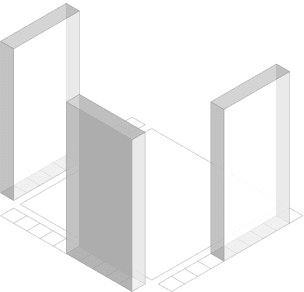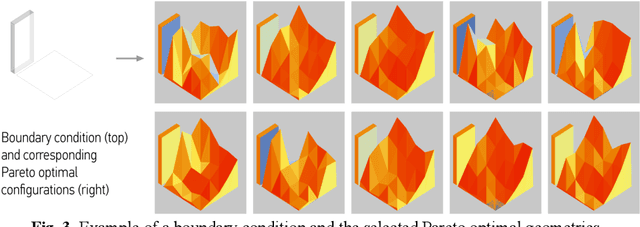Spyridon Ampanavos
Early-Phase Performance-Driven Design using Generative Models
Jul 19, 2021



Abstract:Current performance-driven building design methods are not widely adopted outside the research field for several reasons that make them difficult to integrate into a typical design process. In the early design phase, in particular, the time-intensity and the cognitive load associated with optimization and form parametrization are incompatible with design exploration, which requires quick iteration. This research introduces a novel method for performance-driven geometry generation that can afford interaction directly in the 3d modeling environment, eliminating the need for explicit parametrization, and is multiple orders faster than the equivalent form optimization. The method uses Machine Learning techniques to train a generative model offline. The generative model learns a distribution of optimal performing geometries and their simulation contexts based on a dataset that addresses the performance(s) of interest. By navigating the generative model's latent space, geometries with the desired characteristics can be quickly generated. A case study is presented, demonstrating the generation of a synthetic dataset and the use of a Variational Autoencoder (VAE) as a generative model for geometries with optimal solar gain. The results show that the VAE-generated geometries perform on average at least as well as the optimized ones, suggesting that the introduced method shows a feasible path towards more intuitive and interactive early-phase performance-driven design assistance.
Structural Design Recommendations in the Early Design Phase using Machine Learning
Jul 19, 2021



Abstract:Structural engineering knowledge can be of significant importance to the architectural design team during the early design phase. However, architects and engineers do not typically work together during the conceptual phase; in fact, structural engineers are often called late into the process. As a result, updates in the design are more difficult and time-consuming to complete. At the same time, there is a lost opportunity for better design exploration guided by structural feedback. In general, the earlier in the design process the iteration happens, the greater the benefits in cost efficiency and informed de-sign exploration, which can lead to higher-quality creative results. In order to facilitate an informed exploration in the early design stage, we suggest the automation of fundamental structural engineering tasks and introduce ApproxiFramer, a Machine Learning-based system for the automatic generation of structural layouts from building plan sketches in real-time. The system aims to assist architects by presenting them with feasible structural solutions during the conceptual phase so that they proceed with their design with adequate knowledge of its structural implications. In this paper, we describe the system and evaluate the performance of a proof-of-concept implementation in the domain of orthogonal, metal, rigid structures. We trained a Convolutional Neural Net to iteratively generate structural design solutions for sketch-level building plans using a synthetic dataset and achieved an average error of 2.2% in the predicted positions of the columns.
 Add to Chrome
Add to Chrome Add to Firefox
Add to Firefox Add to Edge
Add to Edge